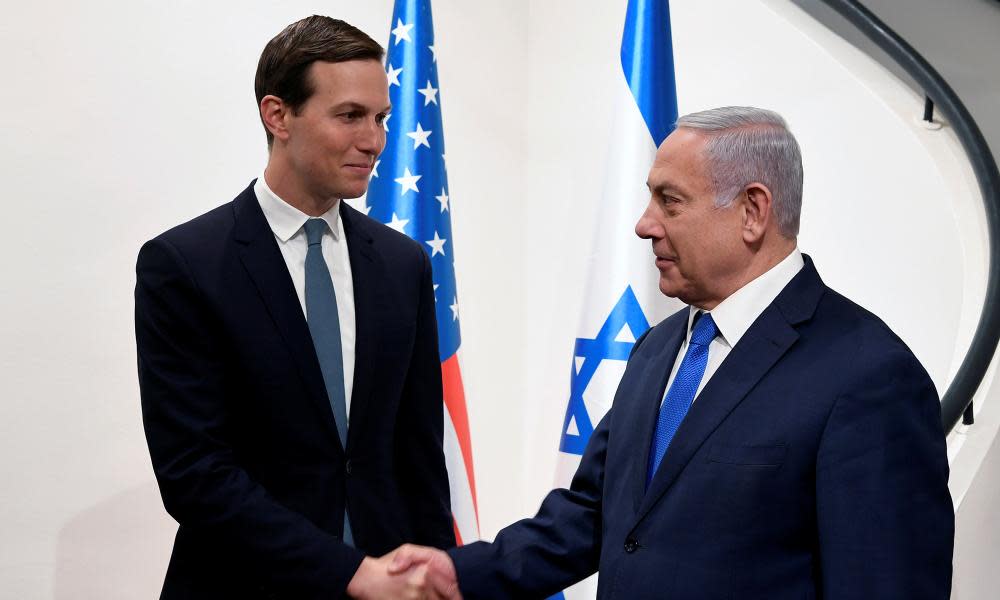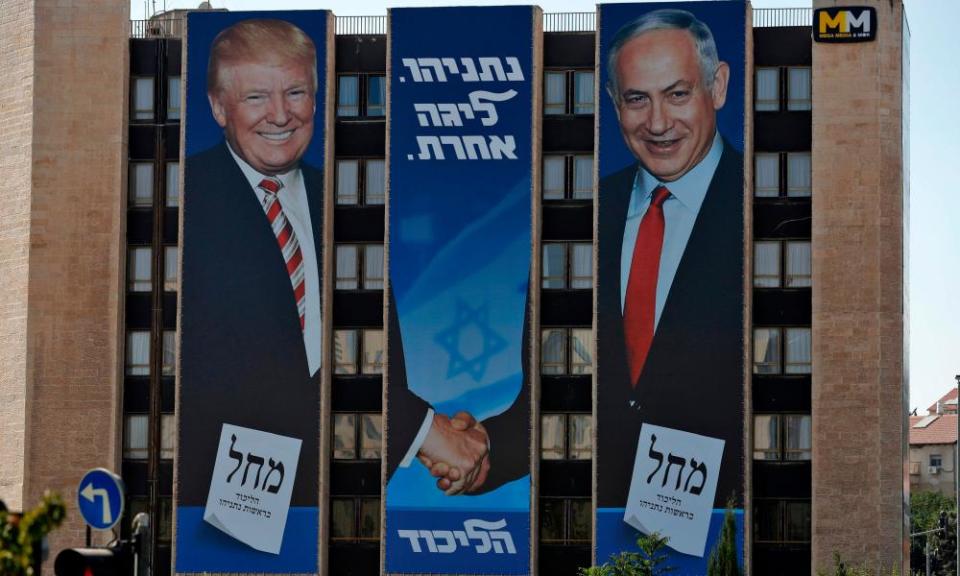'Don't talk about history': how Jared Kushner crafted his Middle East 'peace' plan

When Jared Kushner took on the Israeli-Palestinian conflict alongside his many other official duties – promoting American innovation, arms sales to Saudi Arabia, the US opioid crisis – he decided to begin with a blank slate.
“He said flat out, don’t talk to me about history,” said Aaron David Miller, a US peace negotiator for previous administrations who was consulted by Kushner. “He said, I told the Israelis and the Palestinians not to talk to me about history too.”
This was a daring approach to a conflict and region steeped in every bitter turn of history. During one of a handful of meetings, Miller reminded the president’s son-in-law of William Faulkner’s observation: “The past is never dead. It’s not even past”.
Kushner decided to deal with the problem of history intruding on talks by engineering a proposed settlement to the Israeli-Palestinian crisis without negotiations or even really talking to one of the parties.
Related: Trump: if Jared Kushner can't achieve peace in Middle East, 'it can't be done'
“I think Jared has a real conviction that he’s the Frank Sinatra of the peace process. He’s going to do it his own way,” said Miller.
The result is the “ulitmate deal”, as Donald Trump described it, that the president is expected to formally present to the Israeli prime minister, Benjamin Netanyahu, at the White House on Tuesday. But enough details have leaked for the proposals to be widely scorned as favouring Israel by opening the door to its annexation of large parts of the occupied territories and giving it almost total control of Jerusalem.
Trump appointed Kushner, a developer who is married to the president’s daughter Ivanka, to oversee the US’s policy on Israel and Palestine even though he has no experience of Middle East diplomacy.
A lack of experience in Middle East negotiations is not necessarily a hinderance to trying to forge a peace agreement – and might be an asset compared to those who lost their way in the weeds of positioning of checkpoints and access to Gaza. George Mitchell was relatively unexperienced in Northern Ireland before playing a crucial role as the US envoy in building peace.
But Kushner’s appointment raised eyebrows because it appeared to be based on little more than who he married, although Trump called him a “natural talent”. It didn’t help that it wasn’t even going to be his full time job but tacked on with a lot of other tasks. But perhaps the key was that Kushner has close family ties to Netanyahu who is facing an election in March.

The make up of Kushner’s team was an early clue to where it the process was headed. It included David Friedman, a lawyer with close ties to the Jewish settler movement in the occupied territories who Trump appointed as US ambassador to Israel. Friedman has questioned the need for a Palestinian state and likened members of a liberal US Jewish group to Nazi collaborators for their criticism of the Israeli government’s actions.
The Trump administration then alienated the Palestinians with a series of actions in Israel’s favour including moving the US embassy to Jerusalem and slashing funding for Palestinian refugees. Kushner toured Middle East capitals seeking to get the kings of Saudi Arabia and Jordan, and Egypt’s authoritarian president, to pressure the Palestinian Authority into going along with the White House plan.
Among those wooed by Kushner was the Saudi crown prince, Mohammed bin Salman, which goes some way to explain – alongside arms deals – why the Trump administration has let him off the hook over the murder of the Saudi dissident journalist Jamal Khashoggi.
Jared has a real conviction that he’s the Frank Sinatra of the peace process. He’s going to do it his own way
Aaron David Miller
Miller was sceptical of the process even before the administration soured relations with the Palestinians.
“I said to Jared you’re not going to fix this because the problem is not the United States. You can make it worse but you’re going to have a hard time making it better because what needs to be done can’t be done by the United States. It requires fundamental decisions by the Israelis and Palestinians. Neither side is prepared to make them. They lack leaders who are capable of making them,” he said.
Miller, who met with Kushner a handful of times and describes him as very respectful, said the president’s son-in-law has indeed made it worse. But he concluded that the process has not been driven by a desire for a negotiated settlement so much as to bolster the prospects of Netanyahu’s re-election – because that helps Trump’s prospects of holding onto the White House.
“It is tethered to a set of political and personal objectives which in my judgment have little or nothing to do with creating a realistic and sustained negotiating process,” he said.
Miller noted that Kushner will be running Trump’s re-election campaign and that a plan that helps get Netanyahu re-elected by giving Israel a green light to annex large parts of the occupied West Bank will in turn help the president not least with the Christian evangelical vote which is very supportive of the Jewish state.
“I told Jared you’re going to put out a plan that meets the needs or requirements of only one side. And I said that’s a serious problem because American credibility and integrity is also on the table. Not just American politics and re-election of Donald Trump,” he said.

